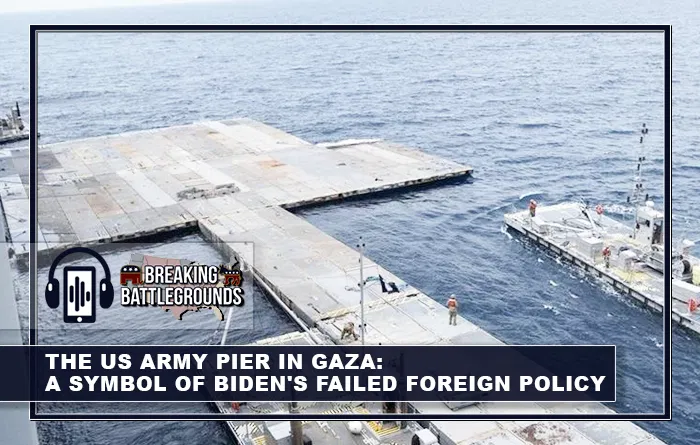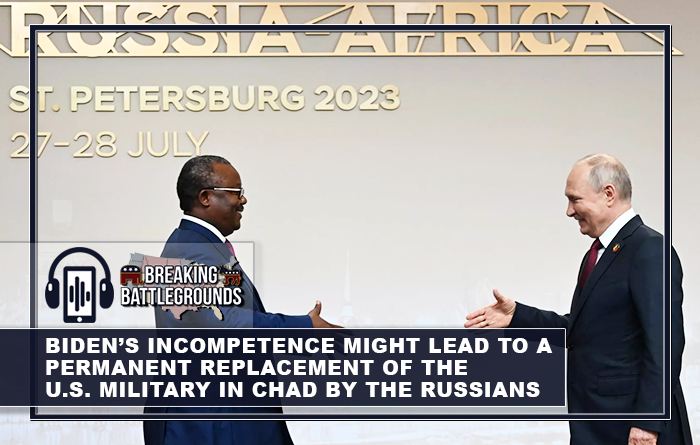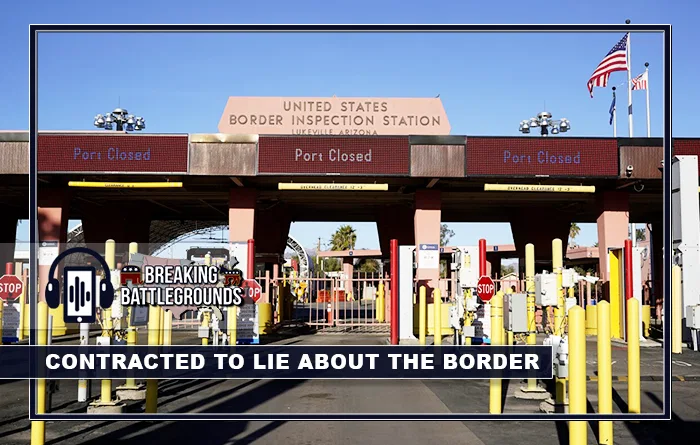Imagine a grand, gleaming pier stretching out into the turbulent waters off the coast of Gaza, built with great fanfare and promises of relief for the weary. This pier, intended to be a beacon of hope, stands as a testament to President Biden’s foreign policy—a costly and well-intentioned project that has ultimately failed to deliver. This metaphor extends to the administration’s catastrophic withdrawal from Afghanistan, which resulted in costly loss of US prestige, power projection and military equipment.
The Pier: A Costly Monument
The construction of this pier, like Biden’s foreign policy initiatives, involved a substantial investment of resources. This dangerous effort with marginal benefit will cost the American taxpayers at least $320 million to operate the pier for only 90 days. Millions of dollars were poured into its development, mirroring the administration’s significant financial commitments on the global stage. Like Ukraine and Afghanistan before it, the Biden administration fails to deliver on any of the promised results. The funds were supposed to support humanitarian aid, improve international relations, and bolster America’s image abroad. Yet, despite this hefty investment, according to the pentagon, none of the 569 metric tons of the humanitarian aid delivered at the pier has made it to the Palestinians. Much like the lofty promises of Biden’s foreign engagements, the pier failed to deliver the promised results.
Bureaucratic Waves and Logistical Undertows
The pier’s failure to deliver relief materials is akin to the bureaucratic and logistical entanglements that have plagued Biden’s foreign policy. Despite the physical structure being ready, the operation has been stalled by red tape, miscommunication, and poor coordination among various agencies and stakeholders. This mirrors the administration’s struggles to effectively execute its international strategies, often finding itself mired in bureaucratic inertia and conflicting interests.
Security Storms and Political Currents
Security concerns in Gaza, which have prevented the pier from fulfilling its mission, are emblematic of the broader geopolitical storms that have rocked Biden’s foreign policy boat. My source, who is at the pier, has said they are under constant mortar fire.
“They need to scrape the mission, cut our losses and get out of there. They are wasting money and risking lives for literally no reason.
There is no pier anymore, and they decided to not push aid through the pier days before it even started sinking. So even if there was a pier, it’s not gonna be used. The whole thing is pointless and dangerous.”
Ensuring safe passage for aid—similar to securing international cooperation and peace—has proven to be an insurmountable challenge for the Biden administration and their failed foreign policy clown car. Constant threats and instability have paralyzed the pier’s operation, just as staff incompetence, indecisive decision making, and increasing global crises have hindered the administration’s efforts to promote stability and cooperation in the region and around the world.
The Humanitarian Mirage
The pier, intended to be a conduit for vital supplies, has become a mirage for the suffering Gazans—promised relief that never arrives. This is reflective of the administration’s foreign policy promises that have fallen short. From the withdrawal from Afghanistan to the ongoing conflicts in Ukraine and the Middle East, the intended humanitarian and diplomatic benefits have often turned into illusions, leaving those in need no better off and sometimes worse.
Strategic Shipwreck and Afghanistan's Legacy
The pier’s failure has broader implications, echoing the strategic missteps in Biden’s foreign policy. The botched withdrawal from Afghanistan serves as a stark comparison. The hasty and poorly managed exit – turned unconditional surrender to the Taliban, not only resulted in a humanitarian crisis but also saw the abandonment of vast amounts of military equipment, now in the hands of the Taliban. It’s estimated that the US invested over $80 billion dollars in equipment and training in Afghanistan over 20 years and left more than 10 billion dollars of advanced equipment behind for the Taliban. Some of which has turned up on the battlefield in Gaza and Pakistan among others. Today Afghanistan has again become a sanctuary for terror organizations, and one of the best armed militaries in the world.
More importantly this debacle severely tarnished U.S. prestige and highlighted the consequences of inadequate planning and execution. After our withdrawal, China immediately recognized the new Taliban government and has worked hard to secure access to Afghanistan’s treasure trove of $1 trillion dollars in rare earth mineral resources, as part of its “Belt and Road initiative.” Just as the pier has become a point of contention between Israel and Palestine, the Afghanistan withdrawal has eroded trust in U.S. commitments and capabilities, damaging alliances, and emboldening adversaries.
Loss of Prestige
Every failure comes with a cost, and the Biden administration has seen a series of foreign affairs failures. It started with Afghanistan, which opened the door to Russia’s invasion of Ukraine, subsequently bringing China, Iran, and Russia closer together—something the West has feared for decades. Hamas attacked Israel, further destabilizing the region, and leading to a massive invasion of Gaza. The Houthis attacked shipping in the Red Sea and the Horn of Africa. Iran struck Israel, and Israel struck Iranian proxies in Syria and Iran, leading to greater fears of an expanded war.
But unseen by many is the loss of bases in Niger, where only a few weeks ago the government ordered the US out of the country, forcing the US to withdraw by September of this year and replacing US forces with Russian troops. Similarly, other African countries, including Chad, are considering replacing US forces with Russian forces. Just this week, Turkish President Erdogan, representing a NATO member state, called on the “Islamic world” to take united action following the latest Israeli strikes on Gaza.
“I have some words to say to the Islamic world: what are you waiting for to take a common decision?” Erdogan told lawmakers from his AKP party, adding that “Israel is not just a threat to Gaza but to all of humanity.”
The world is descending into chaos and the Biden administration can’t even build a dock and secure it.
Conclusion
The US Army pier in Gaza, broken and unusable, is a stark metaphor for the shortcomings of Biden’s foreign policy. Despite significant investment and wishful thinking, both have failed to deliver tangible results, bogged down by slow decision-making, incompetence, bureaucratic hurdles, security concerns, and strategic miscalculations. The parallels with the disastrous withdrawal from Afghanistan further underscore these failures, showcasing a pattern of mismanagement that leads to significant losses—whether in financial resources, military assets, or international standing.
The question remains whether the Biden administration is capable of making any correct foreign policy decisions. I don’t think they are. In fact, I would argue that the answer is to elect Trump. The seas were steady, and the US had a four-year track record of success under Trump, marked by decisive actions and a nuanced understanding of international dynamics that made a positive impact on the global stage.
Note: the opinions expressed herein are those of Russ Walker only and not Breaking Battlegrounds’ staff.























